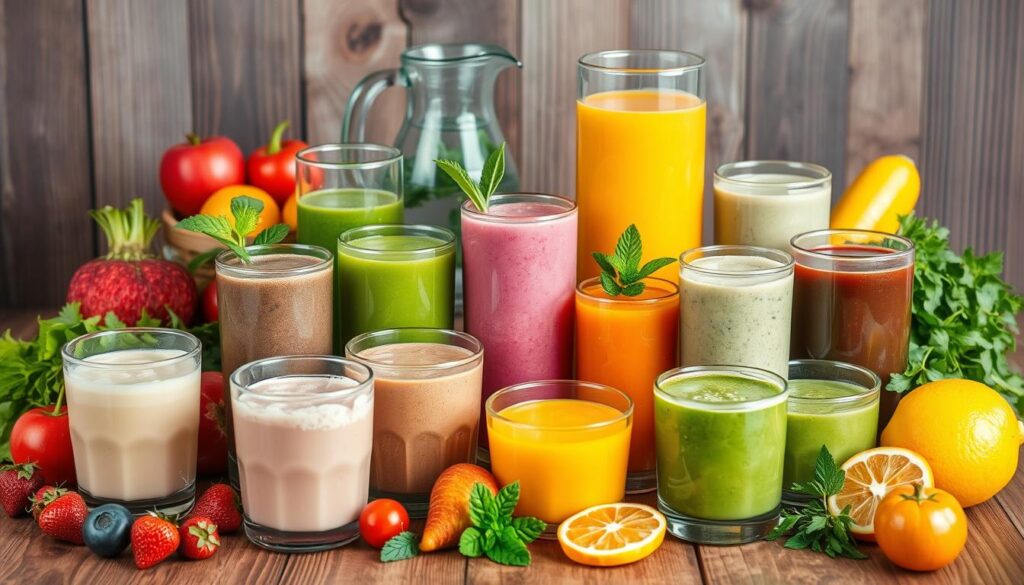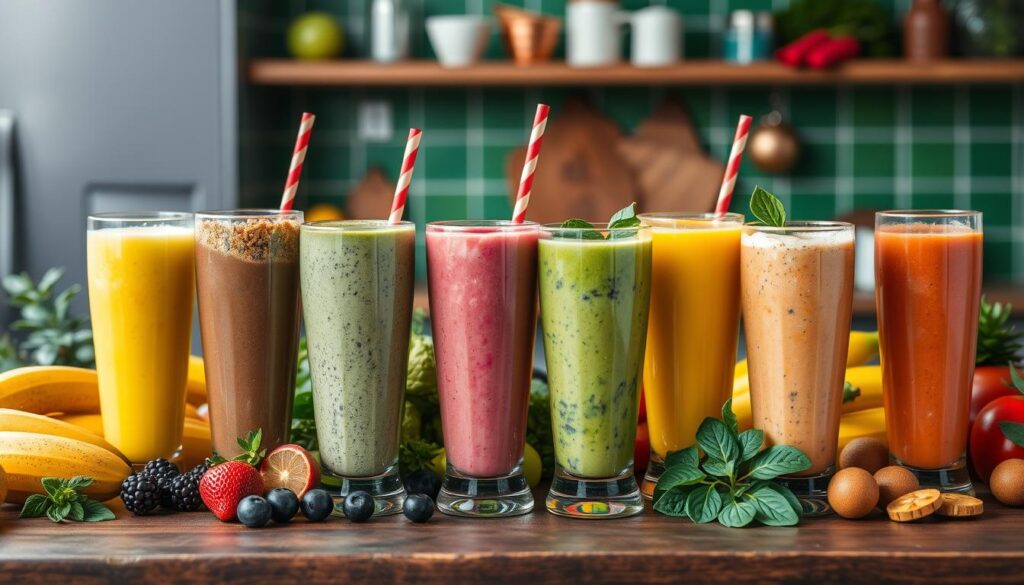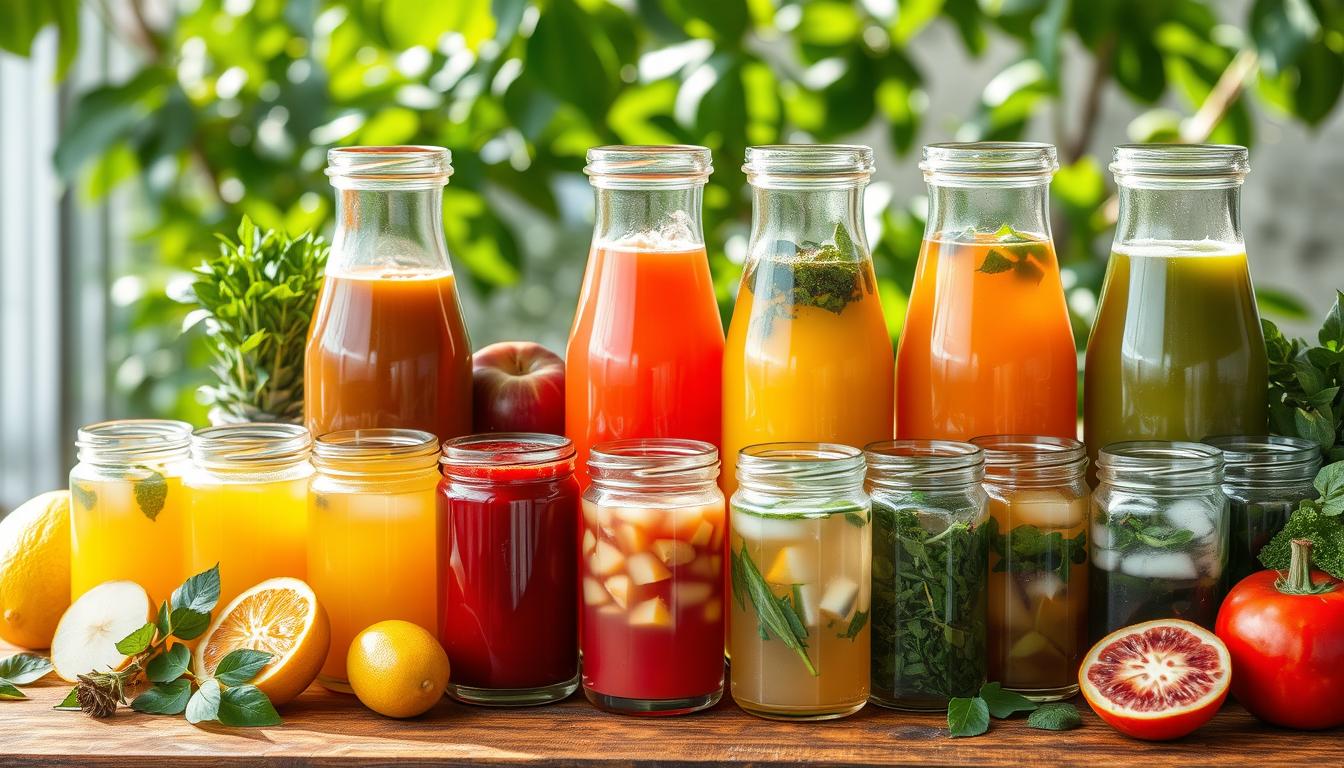Starting a journey to better health often leads us to explore different diets. Water and liquid diets are among them. In The Ultimate Guide to Water and Liquid Diets for a Healthy Lifestyle, we’ll look at how these diets help in health and medical situations. A clear liquid diet includes water, broth, and gelatin, making it easy for the body to digest.
A full liquid diet, on the other hand, includes more foods like milkshakes and soups. It’s good for those recovering and still easy on the stomach.
Hydration is key in a clear liquid diet, providing essential nutrients when we can’t eat solids. This diet shows us how important water is for our bodies. A liquid cleanse can refresh the digestive system, but it’s not meant for long-term eating.
Key Takeaways
- Short-term adherence to a clear liquid diet aids in both medical procedure preparation and digestive rest.
- A balanced full liquid diet can provide necessary nutrients during a transitional phase, like post-surgery recovery.
- Rigorous hydration and electrolyte balance are pivotal benefits of a clear liquid diet.
- Individual health conditions, such as diabetes, call for specialized liquid diet modifications for safety.
- Consulting healthcare professionals and registered dietitians is crucial when planning a liquid diet for health or medical reasons.
- While significant weight loss is possible, a liquid diet is short-term and requires medical oversight for extended use.
- A full liquid diet’s calorie and protein content needs careful consideration to meet an individual’s daily nutritional requirements.
Understanding Water & Liquid Diets: An Overview
Exploring water and liquid diets can be a game-changer for digestive health or medical procedures. These diets are simple yet varied, from clear liquids for medical prep to full liquids for a healthy lifestyle.
Defining Clear Liquid and Full Liquid Diets
A clear liquid diet includes water, tea, broth, and gelatins. It helps your digestive system rest while keeping you hydrated. It’s often used in medical settings to prepare patients or aid in recovery.
A full liquid diet adds opaque liquids like milk and ice cream. It’s more nutritious and can be a step towards eating solid foods again.
The Role of Liquids in Digestive Health
Liquids are key for digestive health, easing the digestive tract’s workload and keeping you hydrated. Both clear and full liquid diets help maintain hydration and electrolyte levels. They offer a therapeutic benefit in digestive issues or after surgery.
Transitioning Between Different Types of Liquid Diets
Going from a clear to a full liquid diet, and then to solid foods, is a gradual process. It’s important to monitor this transition to ensure you’re getting the right nutrients without stressing your digestive system. This step helps prevent malnutrition and prepares your body for solid foods.
Considering a liquid diet for weight management, medical prep, or digestive health? Knowing how to transition between diets is key for a healthy lifestyle. Always talk to healthcare professionals like dietitians or nutritionists to make these diets work for you.
The Ultimate Guide to Water and Liquid Diets for a Healthy Lifestyle
Welcome to your ultimate guide on embracing water diets and liquid diets for a healthy lifestyle. This guide will help you understand these diets, whether for a liquid diet detox or to enjoy the water diet benefits.
Liquid diets are not just for losing weight. They are also used for medical reasons, like before surgery or when recovering from digestive issues. It’s important to know when and how these diets work best. Learn more about full liquid diets.
For a good liquid diet, you need balanced nutrition. Adults should choose healthier drinks, like lower-fat milk or unsweetened plant-based drinks. Pregnant women should limit caffeine to 200mg a day to avoid health risks.

Adults need about 15.5 cups (men) and 11.5 cups (women) of fluids daily. Foods like watermelon and spinach also count towards this goal because they are very watery.
But, starting a liquid diet should be done carefully. Kids should avoid sugary drinks to prevent obesity. Instead, they can drink pasteurised milk or plant-based milk after infancy.
| Age Group | Recommended Drinks | Drinks to Avoid |
|---|---|---|
| Children (1-18 years) | Pasteurised milk, water, unsweetened juices (limited) | Sugary fizzy drinks, high-sugar smoothies |
| Adults | Low-fat milk, unsweetened plant-based drinks, water | High-sugar beverages, excessive caffeine |
| Pregnant Women | Water, low-caffeine options | Drinks high in caffeine (>200mg/day) |
Using liquid diets for a healthy lifestyle can be good, but you need to understand it well. Always talk to a healthcare provider to make sure it’s safe and right for you, especially for a liquid diet detox or managing health issues like Crohn’s disease.
Whether you’re on a full or clear liquid diet, the goal is to keep your body nourished and hydrated. This helps your body adjust to the new diet.
Health Benefits and Nutritional Balance of Liquid Diets
Exploring liquid diets reveals many health benefits of water diet and nutritional balance. They are great for people recovering from surgery or with digestive issues. These diets are becoming more popular for their liquid diet benefits.
Liquid diets are good for diet for digestive health. They help the digestive system heal by reducing stress. They include broths, juices, and smoothies, which clear the gut, hydrate, and replace lost electrolytes.
Also, a well-planned liquid diet can give you lots of vitamins and minerals. This is especially true for drinks like enriched shakes and soups. These diets focus on managing calories while still giving you all the nutrients you need. A dietitian can make these diets fit your energy needs and health goals, making them a flexible health option.
But, it’s important to remember that liquid diets have risks. They can lead to nutritional deficiencies if not done right. Here’s how to keep them balanced and effective:
- Monitoring Nutrient Intake: Make sure each meal has a variety of nutrients to avoid common deficiencies like protein or fiber.
- Calorie Management: Watch your calorie intake to avoid too little energy, which is important for your metabolism and health.
- Consultation with Health Professionals: Work with healthcare providers to make the diet fit your health needs and lifestyle.
In summary, the health benefits of water diet and liquid diet benefits are real, especially for diet for digestive health. But, achieving nutritional balance needs careful planning and expert advice. When done right, liquid diets are powerful tools for healing and wellness.
Planning Your Liquid Diet: Meals and Menus
Starting a liquid diet needs careful planning to meet your nutritional needs. It’s important to stay hydrated and use liquid diet supplements and shakes. Here’s how to make a good liquid diet meal plan.
Creating a Balanced Full Liquid Diet Meal Plan
Planning your liquid diet meals is key, whether for weight loss or health reasons. A good plan includes juices, broths, milk, and cream-based soups. This ensures you get all the vitamins and nutrients you need. Here’s a simple plan:
- Breakfast: A smoothie with low-fat yogurt and fresh berries.
- Mid-morning snack: A nutritional shake with protein, vitamins, and minerals.
- Lunch: Bone broth with herbs.
- Afternoon snack: Thinned oatmeal or cream of wheat.
- Dinner: Puréed soup with blended vegetables.
- Evening snack: A gelatin cup with fruit juice.
For a meal plan that fits your specific needs, visit specialized resources.
Hydration and Frequency of Liquid Meals
Staying hydrated is crucial for a liquid diet. Drinking water is important, but you can also try herbal teas and clear broths. Eat small, frequent meals, about six to eight a day, to keep your energy up and hunger in check. Learn more about hydration.
Incorporating Supplements and Nutritional Shakes
Since you’re not eating regular food, it’s vital to use liquid diet supplements and shakes. These products help fill nutritional gaps and often have lots of proteins, vitamins, and minerals.
| Supplement Type | Key Nutrients | Benefits |
|---|---|---|
| Protein Shakes | Protein, B Vitamins | Supports muscle and tissue repair |
| Meal Replacement Shakes | Fiber, Protein, Various Vitamins | Curbs hunger, supports weight loss |
| Multivitamin Drinks | Wide range of vitamins and minerals | Prevents nutritional deficiencies |
Note: Always talk to a healthcare provider before starting any new supplement, especially on a liquid diet.

Addressing Common Concerns and Safety Measures
Starting a liquid diet can raise safety of liquid diets and common concerns with liquid diets. It’s key to know the risks and how to manage weight loss safely. This approach makes liquid diets safer and more beneficial for those trying them.
Considerations Before Starting a Liquid Diet
Always talk to a doctor before starting a liquid diet. They check if it’s right for your health and needs. A dietitian can also help make the diet fit your health better.
Managing Digestive Health and Potential Risks
It’s important to watch how your body reacts to liquid diets. Look out for signs like bloating or diarrhea. Adding fiber and watching your fluid intake can help keep digestion healthy.
Navigating Weight Loss and Weight Management
While liquid diets can lead to quick weight loss, do it under a doctor’s watch. This ensures you lose weight healthily and keep your muscle mass. Gradually adding solid foods helps maintain weight loss over time.
| Age Group | Daily Water Intake | Comments |
|---|---|---|
| Adults 19 and older | Men: 13 cups, Women: 9 cups | Average intake; increases with activity levels |
| Children (1-18 years) | Varies from 4 to 11 cups depending on age | Essential for hydration and physical activity |
| Pregnant Women | 10 cups | Needs increase to support fetal development |
| Breastfeeding Women | 13 cups | Supports milk production and hydration |
In conclusion, knowing the safety and risk factors first is crucial. Adjusting as needed helps avoid health issues. Regular check-ups and tailored plans are key to a successful liquid diet.
Conclusion
Reflecting on water and liquid diets, it’s clear they can help reach health goals. They’re good for staying hydrated, doing a cleanse, or managing weight. But, we must be careful and safe while using them.
These diets are not for everyone. They need to fit our body’s needs and health advice. I’ve learned to watch what I eat to avoid feeling tired or dizzy. They’re easy to follow and help control calories, but we should not overdo it.
Using a liquid diet doesn’t mean we can’t be active. I still do some exercise, even with mostly liquids. Liquid diets can be helpful, but we must listen to our bodies and get doctor advice. Let’s make our health journey smooth and strong, like the diets we choose.




